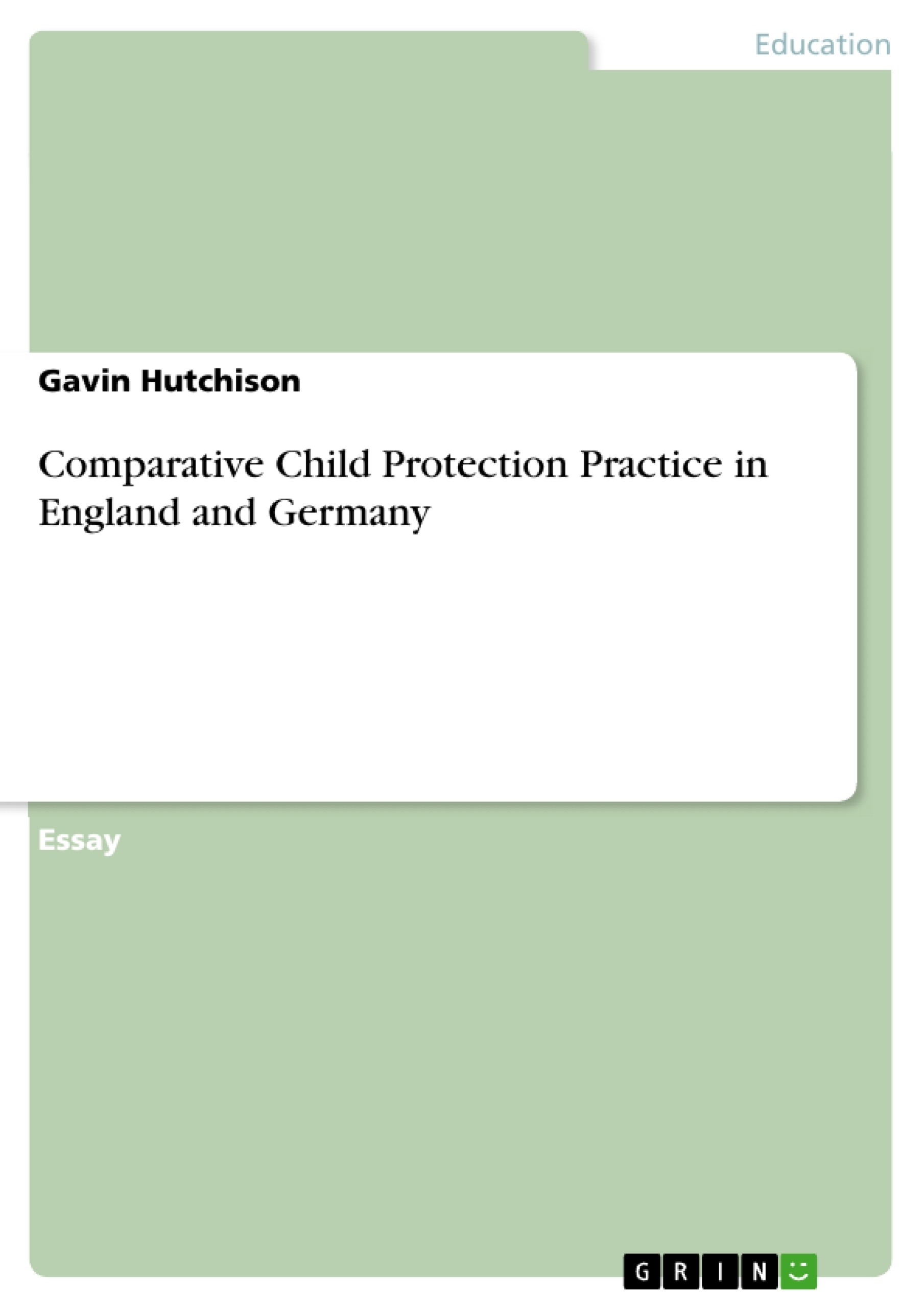Social work practice in relation to child protection has gone through changes in both England and Germany due to global and local processes. International social work policy and professional standards driven by the juxtaposition of neo-liberalism and social justice has become a cornerstone of national and local professional practice contexts. Practice relating to safeguarding children has developed globally through the process of political globalisation, "connecting large scale societies together in a whole variety of ways, from international political agreements electronic communication technologies and more fluid migration patterns.” (Giddens, 2009:110) Policy development and implementation by Supra-National organisations such as the United Nations are often created as universal ‘blanket policies’, with the aim of promoting equality and social justice for all. For example child protection policy in both countries has been influenced by the United Nations Convention on the Rights of the Child (UNCRC) (1989). However” local policy and practice will nevertheless be influenced by national contexts and ‘mediated by country specific institutional arrangements’ – a process describe(d) as ‘glocalization’.” (Lyons et al 2006:34) Further to this national policy development is often not constrained to its boarders and can influence policy development internationally. “Increasingly, national policies are ‘rarely purely domestic in impact’ but have international implications, either because they impact directly or because of ‘social policy emulation’.” (Healy, 2001 cited in Lyons et al,2006:28) Global communication and the availability of data and research has become instantaneous. International and professional leaders and academics are able to compare and contrast theoretical perspectives, policies and practices and adapt them to fit local contexts.
Inhaltsverzeichnis (Table of Contents)
- Comparative Social Work: Children Protection in England and Germany
- Globalisation and the Influence of International Policy
- The United Nations Convention on the Rights of the Child (UNCRC)
- Glocalisation and Disparity in International Implementation
- Governmental Structures and Welfare Models
- Germany: Federalism and Political Decentralisation
- England: Centralised Power and Influence
- Similarities and Differences: Child Protection in England and Germany
- Legislative Developments and the Influence of Media
- The Importance of Collaborative Practice and Multi-Agency Working
- Early Intervention and the Role of Local Networks
- Accountability and Evidence-Based Practice
Zielsetzung und Themenschwerpunkte (Objectives and Key Themes)
This comparative study examines the current state of child protection legislation and practice in England and Germany, highlighting the influence of international policy, national governmental structures, and emerging trends in social work practice.- The impact of globalisation and international policy on child protection
- The influence of national governmental structures on child protection systems
- The role of evidence-based practice and accountability in child protection
- The importance of multi-agency working and collaboration
- The growing emphasis on early intervention and prevention
Zusammenfassung der Kapitel (Chapter Summaries)
- This chapter explores the influence of international policy and the United Nations Convention on the Rights of the Child (UNCRC) on child protection legislation and practice in England and Germany. It examines the concept of "glocalisation" and how national contexts shape the implementation of universal policies.
- This chapter analyzes the governmental structures and welfare models in England and Germany, highlighting the impact of centralized versus decentralized power on child protection systems. It discusses the challenges of enacting and implementing UNCRC compliant legislation in both countries.
- This chapter compares and contrasts child protection legislation and practice in England and Germany, focusing on the impact of political, public, and media interest on legislative developments. It examines the growing importance of collaboration, early intervention, and accountability in both countries.
Schlüsselwörter (Keywords)
This study explores the key concepts of comparative social work, child protection, globalisation, glocalisation, government structures, welfare models, evidence-based practice, multi-agency working, early intervention, and international policy.Frequently Asked Questions
How does globalization affect child protection policy?
Globalization facilitates the spread of international standards like the UNCRC, but these are often "glocalized" or adapted to fit specific national and institutional contexts.
What is the difference between child protection in England and Germany?
England has a more centralized governmental structure influencing social work, while Germany's federal system leads to more political decentralization and local variation.
What is the role of the UNCRC in social work?
The United Nations Convention on the Rights of the Child (1989) serves as a universal framework for promoting child rights and social justice in national legislations.
Why is multi-agency working important in child protection?
Collaborative practice between police, schools, and social services ensures a more holistic view of the child's safety and better information sharing to prevent abuse.
What is "glocalisation" in social policy?
It describes the process where global policies are mediated and adapted by country-specific institutional arrangements and cultural contexts.
- Quote paper
- Gavin Hutchison (Author), 2014, Comparative Child Protection Practice in England and Germany, Munich, GRIN Verlag, https://www.grin.com/document/288682



